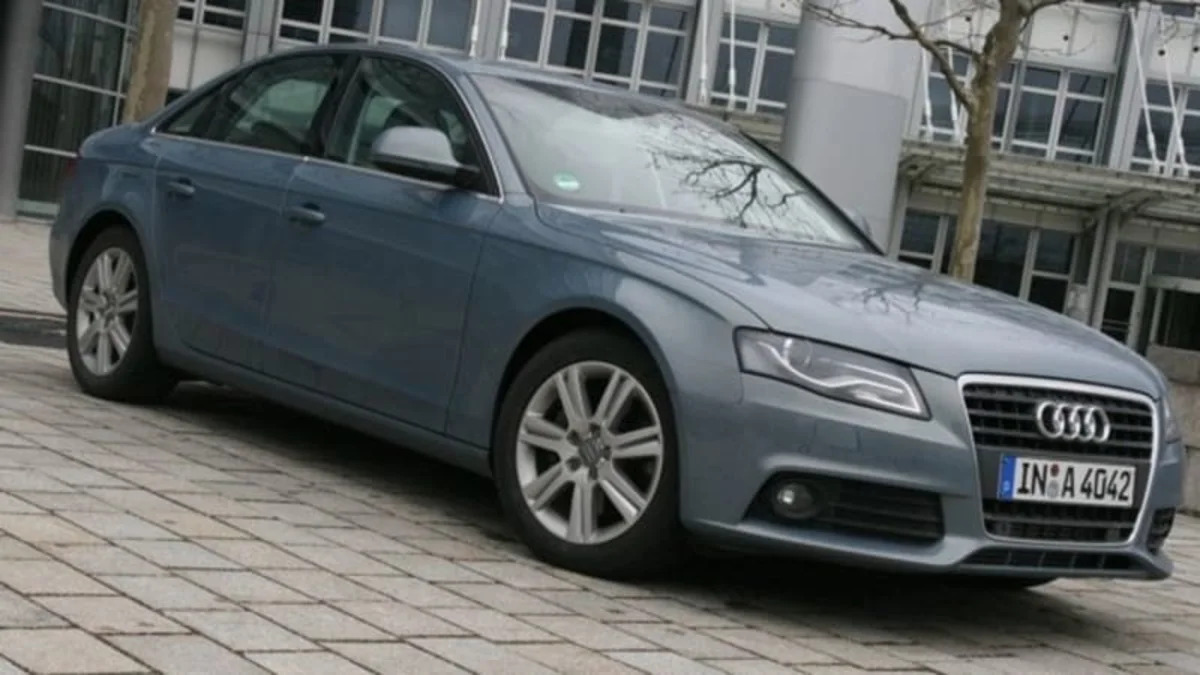Audi A4 - Click above for high-res image gallery
Audi's big green reveal from the Frankfurt Motor Show is undoubtedly the e-Tron electric supercar – especially considering the recent comments about electric cars and diesels made by Audi North America President Johan de Nysschen. But there's another type of fuel/energy that Audi drivers in Germany can now use to move their four-ringed vehicles around: ethanol. Audi has never been a particularly strong proponent of the biofuel, but the A4 and A4 Avant 2.0 TFSI flexible fuel models are not the first to get the ethanol treatment.
The flex-fuel engine is a modified version of the standard 2.0 TFSI with Audi valvelift and start-stop system and both engines have the same torque (236.02 lb-ft between 1,500 and 4,200 rpm) and horsepower (180) outputs. A new A4 running on E85 will get 26 mpg (U.S.) on the European cycle, while the A4 Avant gets just 25.5 mpg (U.S.). Super unleaded petro-gasoline turns these numbers into 36.7 and 35.6 mpg (U.S.), respectively. Germany currently has around 300 E85 stations.
Photos Copyright ©2008 Sam Abuelsamid / Weblogs, Inc.
[Source: Audi]
PRESS RELEASE:
Ingolstadt, 2009-09-15
Audi News Frankfurt Auto Show (IAA) 2009
The Audi A4 and the A4 Avant 2.0 TFSI flexible fuel –bioethanol as fuel
* 2.0 TFSI with 180 hp now also suitable for operation with E85
* Biofuel with significantly better CO2 balance
* Cost advantages for customers
Audi has added a new, particularly economical version to its A4 model series: The A4 and A4 Avant 2.0 TFSI flexible fuel can be operated on bioethanol. The fuel, designated E85, lowers operating costs and features a good CO2 balance.
The 2.0 TFSI flexible fuel engine is based on the 2.0 TFSI with Audi valvelift and start-stop system. Like that engine, it produces 320 Nm (236.02 lb-ft) of torque between 1,500 and 4,200 rpm and puts out 132 kW (180 hp).
The four-cylinder engine is designed for operation on E85 – the typical European mixture of 85 percent ethanol and 15 percent gasoline. E85 is currently available at nearly 300 gas stations in Germany, with Norway and Sweden having the densest network of E85 filling stations in Europe.
Today bioethanol is produced via the alcoholic fermentation of energy crops such as wheat, corn and sugar cane. Thanks to the high renewable fraction, its CO2 balance in the total vehicle is as much as 75 percent more favorable than that of conventional petroleum-based fuel. The Volkswagen Group is actively participating in the research and development of new ethanol production processes from crop wastes for an even better energy balance in the future.
Audi takes advantage of the higher RON 110 octane rating of bioethanol to operate the engine at optimal efficiency. This significantly reduces the roughly 40 percent greater consumption by volume that is a consequence of the lower energy content of ethanol and thus decreases the loss in range.
The advantage of the Audi concept is that the engine can be operated on fuel with any concentration of up to 85 percent ethanol with no noticeable differences in drivability or performance.
The flexible fuel philosophy requires a series of technical modifications. One of the chemical properties of E85 is that it is highly corrosive to certain metals. The base engine had already been designed with these properties in mind, so no modifications to the fuel lines or seals were required.
A different material was required only for the valve seat rings due to the lower lubricating action of the ethanol. A sensor in the fuel line reports the ethanol concentration to the engine management system, which adjusts injection and ignition accordingly.
With E85, the ultra-modern four-cylinder unit achieves a fuel consumption of 9.0 liters per 100 km (26.13 US mpg) in the A4 Sedan and 9.2 liters per 100 km (25.57 US mpg) in the A4 Avant. With super unleaded gasoline it records figures of 6.4 liters per 100 km (36.75 US mpg) in the Sedan and 6.6 liters per 100 km (35.64 US mpg) in the Avant. Because taxes on ethanol are significantly lower than on fossil fuels, however, its use reduces operating costs.
The Audi A4 and the A4 Avant 2.0 TFSI flexible fuel offer the sporty driving enjoyment that characterizes Audi. The sedan accelerates from zero to highway speed in 7.9 seconds on its way to a top speed of 236 km/h (146.64 mph); for the Avant these figures are 8.1 seconds and 228 km/h (141.67 mph). Both models transfer power to the road via the front wheels and a six-speed manual transmission.
The equipment and data specified in this document refer to the model range offered in Germany. Subject to change without notice; errors and omissions excepted.


Sign in to post
Please sign in to leave a comment.
Continue